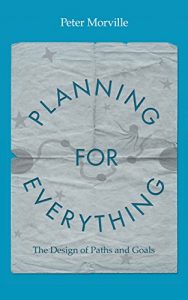 Â Planning for Everything: The Design of Paths and Goals. Peter Morville
 Planning for Everything: The Design of Paths and Goals. Peter Morville
Conversations about project management often invoke Dwight Eisenhower’s dictum that “plans are useless, planning is essential.†We’re agreed that it is the process that matters. Peter Morville’s Planning for Everything offers an extended and illuminating reflection on the nature of that process.
It’s an effective interweaving of vignettes and case examples illustrating how planning principles and practices play out. That actually makes it more actionable and adaptable than generalities or detailed processes and checklists. It certainly doesn’t hurt that Morville is an excellent writer.
The title captures a perspective on planning that squares with where my thinking has been evolving – that effective planning is more about design than about execution and that the design process revolves around the interaction between paths and goals.
The book is organized around six central chapters:
- Framing
- Imagining
- Narrowing
- Deciding
- Executing
- Reflecting
that lay out the essence of planning processes. These chapters are bracketed by chapters stepping back to adopt a wider perspective; some may find those a bit too removed from the pragmatic, don’t let that stop you from working through the core.
There are nuggets of insight throughout the book. I’ve recently been teaching courses on project management and requirements analysis; the combination is triggering thinking about the conflicts between agile approaches and management needs for predictability and control. Morville observes “since no amount of subsequent planning can solve a problem insufficiently understood, problem framing is the most important step in planning.†That reminds me that you can only plan as far ahead as you understand. The debate shouldn’t be about agile or waterfall or scrum; it needs to be about how to generate the best understanding of the problem at hand. Not a stunning insight but something that is too easily forgotten.
This is a book worth re-reading, or at least taking a pass through, whenever you face a significant planning task.